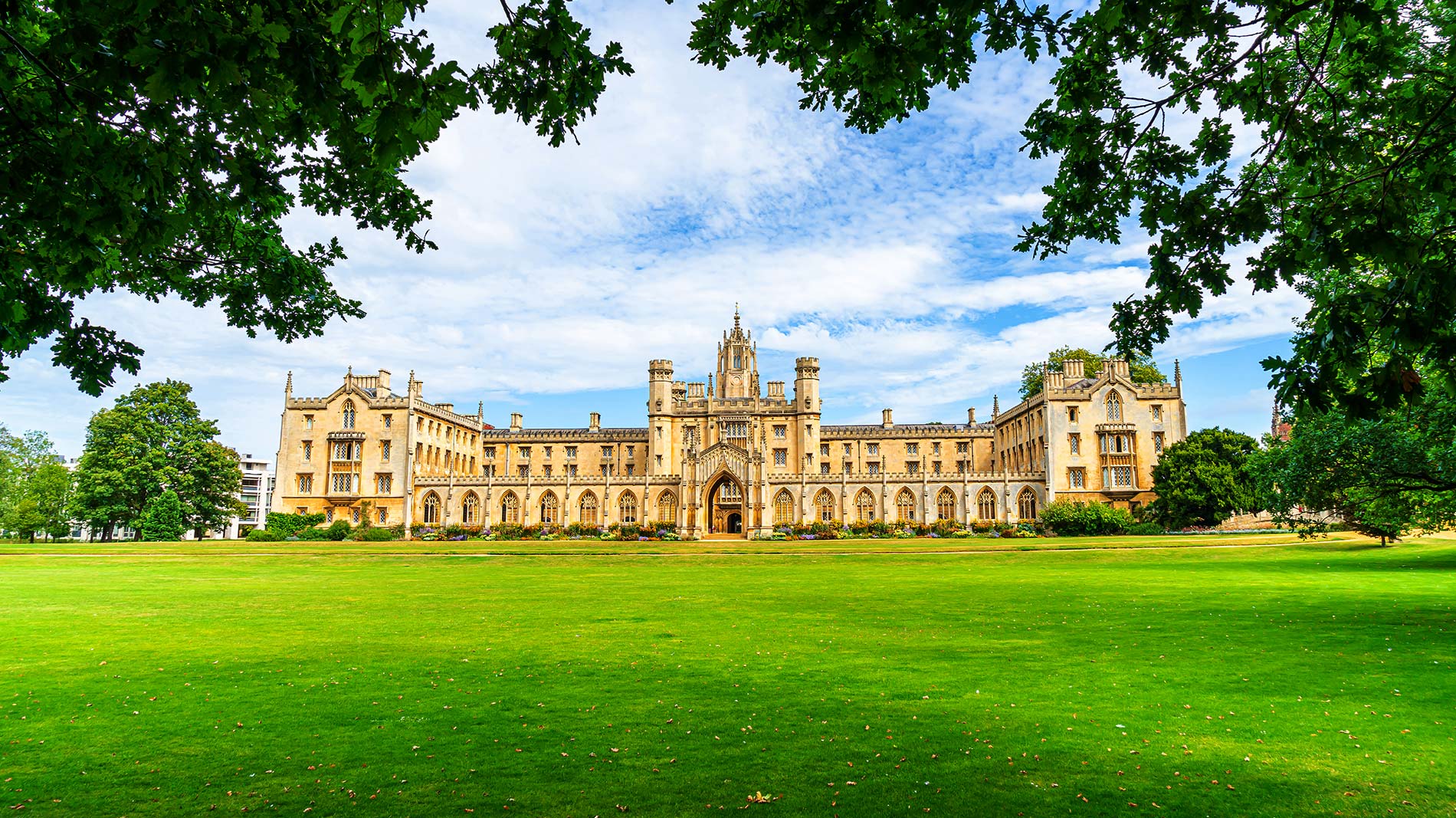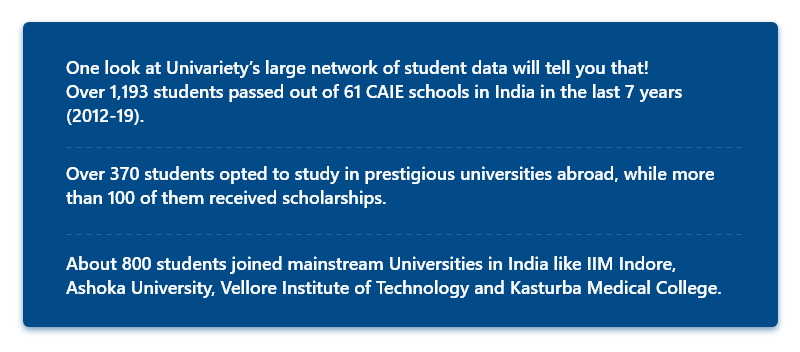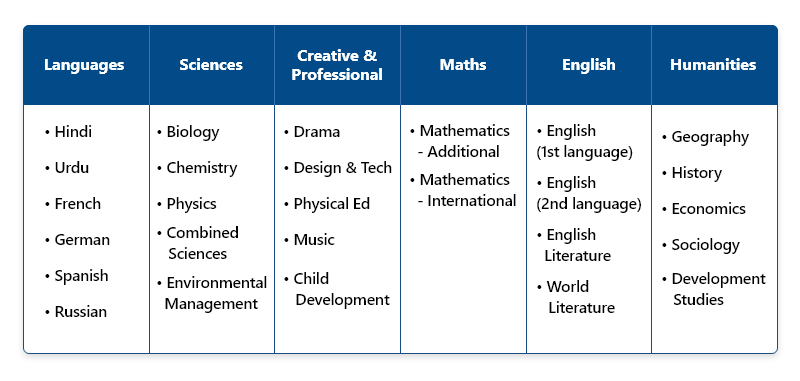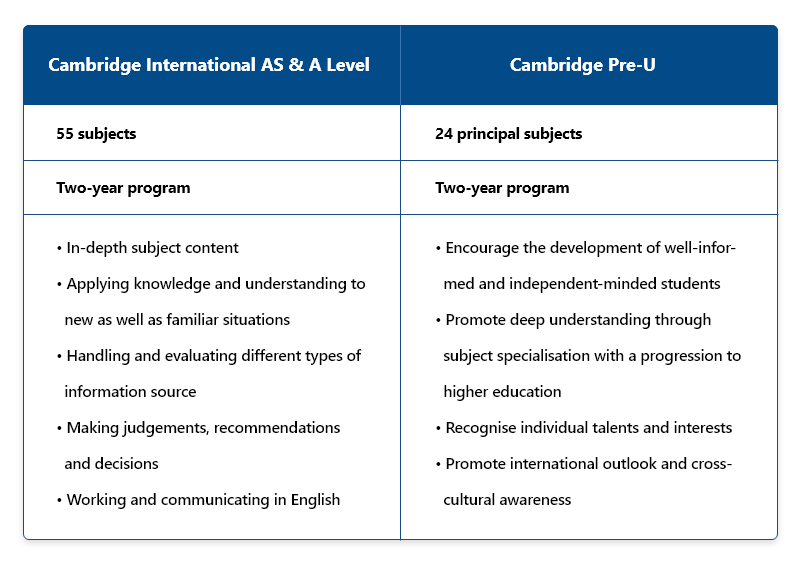If we had to define the Cambridge Curriculum in a simple yet effective way, we would say International in philosophy and approach with local elements and contexts. That’s the board for you – flexible, challenging, and inspiring at the same time.
These are the factors that have made this international board one of the fastest-growing curricula in the country. In the last decade, more than 400 schools across the country have affiliated with the Cambridge Curriculum.
While Indian parents are increasingly aspiring to the England-based curriculum for their children, not many are fully aware of the board and what it really offers. You don’t want to choose a board or school for your child because it’s popular or it seems to be a good option. You want to be sure that it’s the best option!
Have you thought about how Cambridge is different from CBSE or State Boards? What does the curriculum offer to enrich your child’s educational journey? How is the grading system? What are the subjects offered?
These are some important questions that can help you decide if the Cambridge curriculum is the right fit for your child. We have the answers to all your questions!
All about holistic learning: Overview & Philosophy
Let’s first understand what the Cambridge Curriculum truly stands for. Formally known as Cambridge Assessment International Education (CAIE), the board offers a foundation of core subjects, cross-curricular activities, and a holistic approach to learning. Encouraging learners to engage with a variety of subjects and make connections between them is fundamental to the philosophy of the board.
With an aim to make students global citizens, the curriculum emphasises problem-solving education, enhanced presentation skills, and an interdisciplinary approach towards life. The CAIE gives students a clear path to education to achieve their dreams at school and university and professional success from ages 5 to 19, helping them discover new skills they need.
Also Read: How to Choose the Right Curriculum for Your Child? [8 Factors to Consider]
History of CAIE
Founded in 1858, Cambridge Board is a part of the world-renowned University of Cambridge, United Kingdom. It was started with the aim to raise standards in education by administering exams for students.
Today, it is followed by over 8 million candidates a year in 10,000 schools in 170 countries across the world, according to Cambridge International.
Acceptance of the Cambridge Curriculum in India
One of the fastest-growing international curricula in India is undoubtedly the CAIE. India has been associated with Cambridge education for almost a century with an increasing number of students opting for it and schools affiliating too.
Over 420 schools in India offer Cambridge programs and qualifications today. In 2016-17 alone, there were over 68,000 entries for Cambridge IGCSE and Cambridge International AS & A-Level exams in India.
Get a full list of Cambridge Schools in your city here!
With the growing number of students passing out of CAIE, Indian universities with undergraduate programs also recognise Cambridge qualifications and treat it as equivalent to Indian senior secondary.
In fact, to help Indian students apply for Undergraduate programs within the country, the board also shifted its result announcements according to the Indian standards. This is because most Indian colleges close applications by early June, and internationally, results for higher secondary examinations are out only in June-July.
Aditi Agarwal, a former Cambridge student and currently studying Electronics and Telecommunication Engineering at the University of Mumbai, says (as told to cambridgeinternational.org):
Cambridge qualifications have taught me in the best way possible. They developed in me an interest in every topic, along with research and project work. It helped me to grasp new concepts in an interesting way and know how to apply these concepts practically.
National Institute of Open Learning, Association of Indian Universities, and other state education departments including Maharashtra, Goa, West Bengal, Telangana, and Haryana accept Cambridge International certificates and qualifications across their colleges and universities.
On the other hand, Indian students opting for higher education abroad are equally benefited by the Cambridge Curriculum. When compared to Indian boards, CAIE offers a more global and comprehensive approach to primary and secondary education, taking your child closer to her dreams of studying abroad.
Cambridge qualifications enable easy adaptation to professional courses in global universities. UK universities consider grade C and above for AS Level English and thus, students need not appear for IELTS.
The AS and A-Levels offered by IGCSE are powerful programs that help bridge the gap between senior secondary and university education. According to the India Didactics Association, there’s a rise of 21% in entries for AS/A Level programs in India among parents.
Thus, the Cambridge Curriculum provides the right knowledge and skills that will help your child understand her interests. She will be able to make decisions about her future, whether it is to study in a different country or opt for a top college closer to home. The curriculum supports both dreams!
Also Read: Expert Guide to International Baccalaureate (IB) Curriculum [Everything You Need To Know]
What Makes Cambridge Better?
- Flexible Curriculum
What learning expectations do you have for your child? Do you want them to pick Music, while also studying Maths and Science? That’s possible with the Cambridge Curriculum. You can choose from a range of 70 subjects. The board also provides flexibility in examinations.
- Proactive Learning
One of the major reasons for parents choosing the Cambridge curriculum is its approach to learning. The board focuses on enabling students to discover new abilities and develop skills that help them in the future including college and career.
- The dynamic range of subjects
With over 70 subjects at the IGCSE level and over 50 at the A level, students can pick and choose subjects and streams as per their liking and future goals. This allows them to develop a passion for learning — a skill that Cambridge International places at the core of its philosophy.
4 Steps To Success: Structure of the Cambridge Curriculum
Being a frontrunner in imparting quality global education, it’s no surprise that the board classifies its curriculum in 4 categories to ensure different age groups are provided with the kind of learning they need.
The Pathway, as the structure is called, leads your child seamlessly from the primary stage to pre-university stage, making them ready for college and future endeavours.
Understanding the local context and your learning expectations from your child’s education, schools in India offer different combinations that provide a balanced curriculum, suits your culture and ethos. Let’s dive deep into each category for a better understanding of the board:
1. Cambridge Primary
Typically for 5 to 11-year-olds, Cambridge Primary starts learners on an educational journey that aims to make them confident, reflective, innovative, and most importantly, engaged. It is designed to help your child develop skills in 10 subjects including English, Mathematics, Science and Global Perspectives. A few schools also offer the Information & Communication Technology (ICT) program for learners to attain computer literacy.
2. Cambridge Lower Secondary
Cambridge Lower Secondary is typically for students between the age groups of 11 and 14. If you compare it to Indian boards, Lower Secondary is equal to grades 6-10 in CBSE or State Boards.
Aiming to provide a natural progression for your child from primary education, the program continues its syllabus while also preparing her for post-14 education programs.
The first 3 years of the curriculum are focused on developing skills and understanding in English, Mathematics & Science. The list of subjects varies from Digital Literacy and Art & Design to Music and Science.
Assessments: The assessments are similar for the Primary and Lower Secondary curriculum. Schools choose from two major assessment options.
- Progression Tests
With clear guidance, standards and mark schemes, these tests enable learning to be assessed each year. They are conducted at the school level to provide an internal assessment of knowledge, skills, and understanding in subjects opted by your child.
The progression test gives you, as a parent, the opportunity to receive structured feedback with a clear comparison of your child’s strengths and weaknesses. The reports for these tests act as a unique analysis tool, providing suggestions for targeted improvements. Schools can choose between paper-based and on-screen versions of the tests, which are available in English, mathematics and science for stages 7, 8 and 9 of the Lower Secondary Curriculum.
- Cambridge Checkpoint
Centrally moderated by Cambridge International, Cambridge Checkpoint offers an international benchmark for your child, unlike the internally conducted tests.
Your child will receive a statement of achievement and a diagnostic feedback report – detailed enough for you to understand how your child has performed compared to the curriculum, her learning group, school, and against all learners who have taken tests in that series around the world.
For Lower Secondary students, the diagnostic test is conducted twice a year and is mostly taken at the end of Cambridge Lower Secondary.
3. Cambridge Upper Secondary
Cambridge Upper Secondary is where your child makes an important decision for her future. While the previous two categories offer the foundation, this stage is about making choices towards achieving the dream college seat and career goal.
For learners aged 14 to 16 years, it gives your child two routes: Cambridge IGCSE and Cambridge O Level. Let’s dive deeper into the two sections for a better understanding.
- Cambridge IGCSE
The fundamental philosophy of the curriculum, which is apt for 14-16-year-old students, is to engage your child with an option to choose from over 70 subjects including 30 languages with cross-curricular perspectives and learning.
Considering the differing abilities of each child, there is also a choice between Core and Extended curriculum papers in a few select subjects. The IGCSE Extended is for students who are more academically able than the IGCSE Core.
Assessments: The IGCSE assessments happen at the end of the course and can include written, oral, coursework, and practical assessments. Students are awarded grades that are benchmarked using eight internationally recognised grades – from A* to G.
- Cambridge O Level
An internationally recognised qualification, O Level provides your child with preparation for Cambridge Advanced as well as other progression routes. It is equivalent to Cambridge IGCSE.
Unlike IGCSE, this one highlights practical skills and theoretical knowledge and is more examination-based. The program allows your child to choose from 40 options in any subject combination.
Assessments: Cambridge O-level examinations are conducted twice a year – June and November. The grades are benchmarked from A* to E along with U (Ungraded).
4. Cambridge Advanced
After all the years of regular school, Cambridge Advanced is the final step before joining a University. Typically for students between the ages of 16 to 19 years, it offers learners two routes:
Is Cambridge Curriculum The Right Pick For Your Child?
Now that you have all the detailed information about one of the commonly chosen international curricula in India, are you wondering if it’s the right pick for you?
You can’t make the right choice without understanding if you and your child need what this curriculum is offering. But how do you know what you need?
There are several questions and factors that play a huge role in deciding the right curriculum for your child. More often than not, parents rely on advice from friends and family, whose suggestions are based on their expectations.
Find Out What Your Child Needs
If you’re planning to head to Google and search for how to choose the right curriculum, don’t worry! We have the answers for you.
Developed by Univariety with inputs from top CBSE educators, International Baccalaureate Organisation, Cambridge International, and University Faculty, Curriculum Selector is the world’s first curriculum evaluation program for parents that offers a scientifically researched roadmap to choosing the right curriculum for your child.
You will go through the following key steps that will help you make the big decision:
- Deep Fitment Analysis
A questionnaire designed around scenarios based on different factors that help you collect your thoughts and reconsider decisions, and receive a Deep Fitment Analysis at the end.
- Expert Modules
These informative modules will give you insights into the difference between each curriculum and to critical skills that your child needs for the future. Here’s a sample video for you:
- Best-Fit Curriculum Recommendations & Detailed Report
The Recommendations are based on highly reliable research data and are scientifically designed by integrating qualitative inputs with analytical methods.
- Personalised Counselling Session
A one-on-one review of your expectations and the report with a counsellor will help you get an interpretation of your analysis from a guidance expert.
Know More About Curriculum Selector
Now that you have all the required information to understand the Cambridge Curriculum, do you think it’s the right option for your child? Go ahead, take the test, and get results.
Have more questions about the curriculum? Ask us in the comments below!
When Harini Prasad is not busy researching about top trends in education and learning techniques for students, you will find her writing about all things fashion, travel, cinema, and music. A millennial poster-child, Harini is a former lifestyle journalist with specialisation in child rights, gender, and new media journalism. Currently, she is busy exploring the world of marketing and content creation.







3 Comments
Thank you for Sharing
Thank You for sharing a valuable information. I always love your blogs and blogs from hvbglobalacademy.org
Does the Cambridge curriculum in India allow students to appear the competitive exams? how good are they when compared to CBSE students